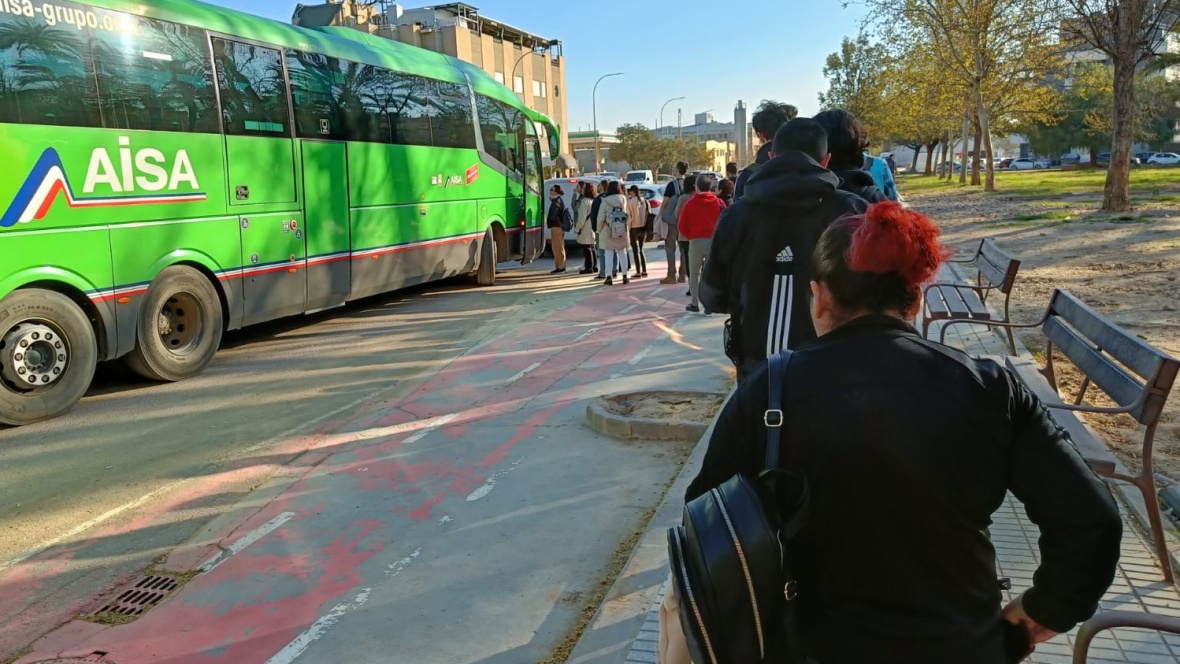The slow recovery after six months of the DANA floods is a reminder that we should not just assume that ‘everything will be fine’.
 Residents of Paiporta, south of Valencia, Spain, wait to board a bus that will take them to a nearby metro station in March 2025. / Photo: Joel Forster.
Residents of Paiporta, south of Valencia, Spain, wait to board a bus that will take them to a nearby metro station in March 2025. / Photo: Joel Forster.
‘Thank you Lord for this day / Thank you, Lord, for being with us, thank you Lord!’ The song we sing every night when putting my daughters to sleep, we also sang yesterday, 28 April 2025. The blackout had blown the fuses across the entire Iberian Peninsula and President Sánchez was still in a crisis meeting.
We sang that same little tune (which we made up on the spot when our eldest was born) when night fell in Paiporta exactly six months ago: my daughters with more enthusiasm than me, as I was completely overwhelmed by the disaster that had just occurred.
Back then, we were left ‘cut off’ sine die without water, gas, internet, or phone networks. There was no transport system, the streets were impassable due to mud and wrecked vehicles, and not a single shop could open. On 29 October, we saw torrents of water more than two metres high rushing furiously through our streets, sweeping everything away. That night, we wondered about neighbours who did not return home, soaked to the skin, until late into the night. All the emergency channels were saturated. The next day, we found out about all the deaths.
The paralysis caused by the major power cut in Spain in recent hours is a reminder (this time for 90% of Spaniards) that we are vulnerable. That nothing is stable.
A drop in the voltage of the electricity grid can lead to a ‘zero’, as the technicians call it. A single day without electricity instils fear, disrupts cities and causes a hole in a country's economy.
The atmosphere in Paiporta was more or less calm yesterday. Parents and children were in the park (still half rebuilt but usable), since it was a public holiday in Valencia. Many of us initially thought that the power cut was caused by reconstruction work (in the underground garages, perhaps?). Then we learned that it was a ‘historic’ national blackout, as the media described it.
Being without internet and school the next day is a nuisance, but it doesn't cause too much of a stir in towns in the Horta Sud area, which haven't been living normally for a long time. The metro is still not working, nor are 90% of the lifts in residential buildings. Cars are still parked in new areas that have had to be set up on building sites and pedestrian areas because the basements of the buildings are still out of use. Somehow, we have become accustomed to a less comfortable life.
In Western Europe, we took it for granted that things simply work. That the worst that could happen is that WhatsApp goes down for a few hours every now and then.
But first the pandemic, then natural disasters in areas where we did not expect them, and now war on the EU's borders have reminded us that our sense of security is an illusion.
We now know first-hand that the state does not guarantee endless well-being. That our resources are limited. That no insurance policy can bring back life or peace to anyone.
We are fragile and incapable. As individuals and as a society. The sooner we learn this (especially my generation), the softer the blow will be.
God is there. Available. Even for societies that thought progress would make them eternal and turn them into a kind of ‘homo deus’ in the style of Genesis 11 and their attempt to build a tower reaching to the sky.
This morning, before sitting down to work at my computer (without Wi-Fi but with 5G internet), I read some advice from Peter, a follower of Jesus, to first-century Christians. ‘Love your brethren, fear God, honour the king’ (1 Peter 2:17).
I think this is a wise principle for times of emergency.
First, be proactive in caring for those closest to you: from neighbours to, of course, brothers and sisters in the faith.
Second, fear God in the midst of confusion. He is sovereign and in control, we can ask for his presence when all else fails because his mercy never fails.
And thirdly, Peter encourages us to respect the work of the authorities. This includes valuing as much as possible the efforts being made to find solutions. It means following the instructions of those in charge of public order. And also, not making the feeling of chaos worse by sharing extreme opinions or unverified information that only cause more despair.
The 'great blackout' we experienced in Spain on 28 April will not be the last crisis we experience. And it certainly will not be the most serious.
Today, when many newspaper columnists in Spain use the concept of ‘apocalypse’ in an exaggerated way, let us remember that our life is certainly fragile, but our Creator promises: ‘Surely I am with you always, to the very end of the age’ (Matthew 28:20).
Joel Forster, director of Evangelical Focus, living in Valencia, Spain.
[analysis]
[title]Join us to make EF sustainable[/title]
[photo][/photo]
[text]At Evangelical Focus, we have a sustainability challenge ahead. We invite you to join those across Europe and beyond who are committed with our mission. Together, we will ensure the continuity of Evangelical Focus and our Spanish partner Protestante Digital in 2025.
Learn all about our #TogetherInThisMission initiative here (English).
[/text][/analysis]

Las opiniones vertidas por nuestros colaboradores se realizan a nivel personal, pudiendo coincidir o no con la postura de la dirección de Protestante Digital.
Si quieres comentar o